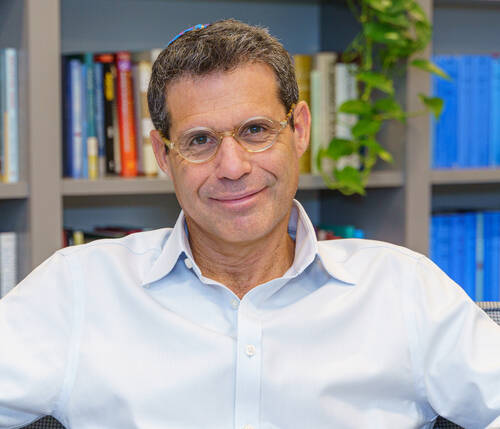Sharansky and Mandela
Sharansky and Mandela

In his book “Never Alone: Prison, Politics, and My People,” Natan Sharansky describes this meeting with Nelson Mandela.
On February 11, 1990, four years to the day after my release, the South African government freed Nelson Mandela…. A few weeks later, I received a phone call…“Mandela knows who you are…he read your book in prison and wants to meet you when he visits America”.
I was curious to meet Mandela too, wondering how he coped during his prison ordeal…. [When we met] he told me that, in 1988, Helen Suzman, the only South African parliamentarian who had fought stubbornly for the right to visit him in prison, gave him a copy of [my book] Fear No Evil. Mandela was in his twenty-fifth year of imprisonment…
“The interrogations were familiar to me,” Mandela told me, “but boy, you really suffered.”
“I suffered?” I asked, surprised. “You suffered three times worse. Twenty-seven years!”
“But,” Mandela replied proudly, “my people were with me. And you were alone.”
I was surprised how agitated his words made me. It felt like he was insulting my partners in crime, the Jewish people. “But my people were with me too,” I proclaimed, equally proudly.
Mandela smiled. “I read your book. It was all in your imagination. My people were with me in real life, all the time.” We compared notes. While both of us had been stuck in a place called a prison, we were in vastly different institutions. Mandela explained that, during his long stretch on Robben Island, he met regularly with his comrades. They ran their revolutionary struggle from their cells. They received frontline reports, set strategy, made tactical decisions, and sent instructions to the field. He didn’t have to play chess in his head.
Was the world of my struggle only imagined? Was I really that alone? For me, my dialogue with my people in prison was no less real than Mandela’s.
What a remarkable story. Mandela, who served nearly three decades in prison, triple that of Sharansky, considered the latter’s tribulation much worse than his. Mandela had his people with him; Sharansky was alone. But Sharansky had a rare mental capacity, as he played chess in his head he never stopped mentally communicating with his people, which gave him the strength to survive the gulag imprisonment.
Most of us are not Sharansky. We need to be part of a real, tangible community to survive, let alone to thrive. Sharansky, as a freedom fighter had no choice—we do. Let’s make 2023 a year of belonging. I encourage you to get out and join any kind of group that puts you together with others. This is the way God created us; as God said “It is not good for a person to be alone” (Genesis 2:18).
Happy 2023!
Fri, June 13 2025
17 Sivan 5785
Upcoming Events
-
Friday ,
JunJune 13 , 2025Birthday and Anniversary Toast
Friday, Jun 13th 6:15p to 6:30p
-
Friday ,
JunJune 13 , 2025Shabbat Service
Friday, Jun 13th 6:30p to 7:30p
-
Saturday ,
JunJune 14 , 2025TOS & Alumni Fun in the Sun Shabbat
Shabbat, Jun 14th 9:30a to 11:30a
-
Tuesday ,
JunJune 17 , 2025Adult Ed: Beginning Hebrew
Tuesday, Jun 17th 6:30p to 7:30p
-
Wednesday ,
JunJune 18 , 2025Mah Jongg
Wednesday, Jun 18th 1:00p to 3:00p
-
Wednesday ,
JunJune 18 , 2025Sisterhood Salon Event
Wednesday, Jun 18th 6:00p to 7:30p
-
Thursday ,
JunJune 19 , 2025Canasta
Thursday, Jun 19th 1:00p to 3:00p
-
Thursday ,
JunJune 19 , 2025Summer Movie Nights with Rabbi Alon
Thursday, Jun 19th 6:30p to 8:30p
-
Friday ,
JunJune 20 , 2025Shabbat Service
Friday, Jun 20th 6:30p to 7:30p
-
Saturday ,
JunJune 21 , 2025Men's Club Summer Dinners at SALUTE RESTAURANT
Shabbat, Jun 21st 6:30p to 7:30p
Update this content.
Come Together
Something meaningful and dynamic is happening here at Temple Beth Am. It springs from the warmth of our welcome and the energy of our actions. We call it: Kulanu - All of Us Together.
Join UsUpcoming Events
-
Friday ,
JunJune 13 , 2025Birthday and Anniversary Toast
Friday, Jun 13th 6:15p to 6:30p
-
Friday ,
JunJune 13 , 2025Shabbat Service
Friday, Jun 13th 6:30p to 7:30p
-
Saturday ,
JunJune 14 , 2025TOS & Alumni Fun in the Sun Shabbat
Shabbat, Jun 14th 9:30a to 11:30a
-
Tuesday ,
JunJune 17 , 2025Adult Ed: Beginning Hebrew
Tuesday, Jun 17th 6:30p to 7:30p
-
Wednesday ,
JunJune 18 , 2025Mah Jongg
Wednesday, Jun 18th 1:00p to 3:00p
Privacy Settings | Privacy Policy | Member Terms
©2025 All rights reserved. Find out more about ShulCloud

